A new focus on the practical applications of dipolar cycloaddition chemistry Dipolar cycloaddition chemistry has found many useful synthetic applications, particularly with respect to the preparation of compounds with new chiral centers. This approach toward asymmetric syntheses is of major importance in both the pharmaceutical and agricultural industries. Synthetic Applications of 1,3-Dipolar Cycloaddition Chemistry Toward Heterocycles and Natural Products provides a comprehensive, current reference for the synthesis of complex molecules based on cycloaddition reactions. Updating Albert Padwa's popular 1984 volume, this new edition shifts the text's focus from theory, structure, reactivities, and selectivities to synthetic applications. Both carbonyl ylides and nitronates, important members of the 1,3-dipole family that were not reviewed previously, are now included. Beyond the ability of the 1,3-dipolar cycloaddition reaction to produce heterocycles, its importance extends to two other areas of organic synthesis, both of which are included in the current volume. First, the heteroatom-containing cycloadducts may be transformed into a variety of other functionalized organic molecules, whether cyclic or acyclic. Second, many 1,3-dipolar cycloadditions have the ability to generate rings (and the functionality derived from transformations of such rings) containing several contiguous stereocenters in one synthetic operation. The authors deal with relative stereocontrol in 1,3-dipolar cycloadditions in detail. Asymmetric versions of these dipolar cycloadditions represent an entirely new aspect of this new edition. Chemists, pharmaceutical, agricultural, and industrial professionals, as well as individual researchers, will find Synthetic Applications to be an invaluable addition to the organic chemical literature.
Hinweis: Dieser Artikel kann nur an eine deutsche Lieferadresse ausgeliefert werden.
Hinweis: Dieser Artikel kann nur an eine deutsche Lieferadresse ausgeliefert werden.








